Kevin Clarke
Operetta Research Center
31 March, 2015
The motto of the project was “Oper sucht Klasse!“, but it was actually all about getting teenagers to sing operetta: 1930s jazz operetta. In the format of a casting show, groups of Berlin school children were made to sing two songs from Paul Abraham’s Ball im Savoy. And present the results in front of a jury and a sold-out opera house. We spoke with Christian Miebach, who coached one of the groups. He used to be a musical comedy student himself, before he discovered the joys of operetta. He now wants to pass on that new love, and teach teenagers why operetta is “hot.”
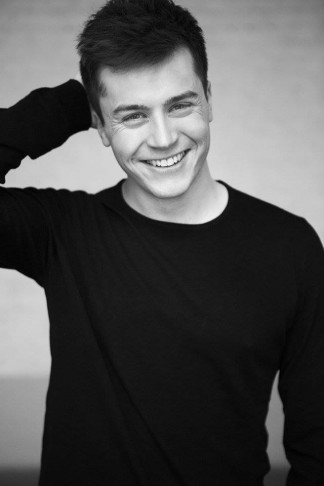
The young singer and coach Christian Miebach.
How do pubescent Berliners react to “jazz operetta”?
The project offered me a chance to work both as vocal/performance coach and as media coach. My job was to support and work together with the music teacher of the class in question. So there was theory and practice, closely combined. In their music lessons the kids heard about Abraham and Ball im Savoy from me and the teacher. After this, I started working with them, because there was only a short time to rehearse. They actually liked Abraham’s music very much, but they didn’t understand the meaning of some of the lyrics and found them rather boring. So my first job was to find subtexts they could connect with. The kids translated the lyrics into their own language. They were totally surprised when they realized that “bummeln geh’n” is the equivalent of “let’s fuck.”
I trained 32 kids from a school in the suburb of Lichtenberg. There were only a few kids who could play an instrument and who could read music, but all of them knew the Komische Oper, because all of them had seen the last project there in the winter of 2014.
The project “Oper sucht Klasse!” used the popular casting show format to help kids feel at home in an operetta context. Do you think such “tricks” are a good way of bringing new audiences to the genre?
Absolutely! As I already said, in my opinion it was the main challenge that the kids realized that operetta is not “dusty” and “boring,” but can be up-to-date and “cool”! The casting idea, building a bridge from the 1920s to the present, gave them some reference point from their own world. And as you can see in those big TV shows, the “dependants” are very proud of their little “stars”. The same fact happened to our kids.
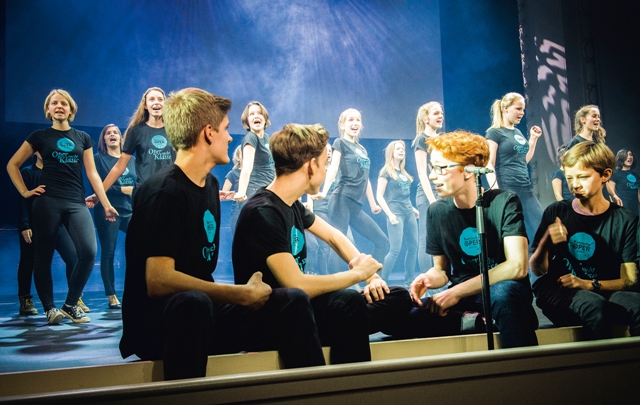
During the actual casting show “Oper sucht Klasse” at the Komische Oper, 2015. (Photo: Jan Windszus)
Many of their families and friends bought tickets for our presentation, cheering and supporting them. Not only by clapping enthusiastically at the school concert, where we first presented our version of Abraham’s “Good Night,” but by recording the performance with their own mobile phones. Kids of all ages shared our project with others in the schoolyard.
Sadly, there was not much response from the other teachers.
Underestimating the whole project, they somewhat boycotted it, because they didn’t allow the kids to leave classes early so they could participate at rehearsals on time at the school gym, or they gave them so much homework that they didn’t have time to focus on operetta properly.
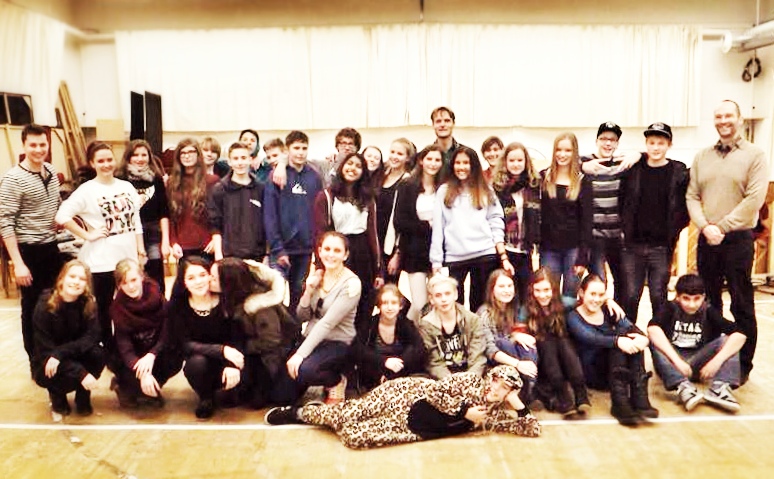
The first rehearsal of the “Christian Miebach Team” at the Komische Oper Berlin. The coach is standing on the far left. (Photo: Private)
In my opinion, most of the teachers didn’t understand what an opportunity this project was, and still is! For the kids: developing their social behavior, they learned to appreciate music, trust each other and to work as a team (indispensable when you perform on stage). Besides, they proved they can cope with such an extreme mission, pushing one other through those three months of rehearsals.
Nevertheless it is just extraordinary to move just one foot of such a big stage the Komische Oper has. I doubt that some of those teachers could ever enter a stage. Ignoring their enormous potential, adults often dismiss the kids of our time, thinking all of them are lazy and superficial.
Did your group ask about Paul Abraham and/or operetta as a genre?
Sure, the media coach told them about Abraham’s terrible fate. The musical director of Ball im Savoy, Adam Benzwi, later did that as well in the Komische Oper.
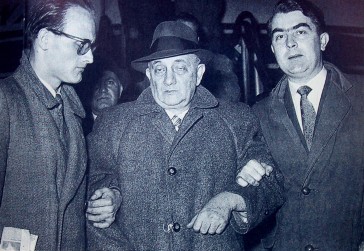
Abraham being escorted off the airplane on this return to Germany, after WW2. He was taken directly to a hospital to be treated for syphilis.
I noticed that the kids are very sensitive – even the boys who mainly tried to behave in a rather “cool” and “relaxed” way. During our training I wanted them to speak about violence and criminal acts they knew, because it’s one of the aspects of our “Good Night” version. Again, this showed how many similarities there are between our own time and what happened in Nazi Germany; the kids immediately filled in their own history.
In your performance, you mixed different styles: operetta and rap, hip hop, sports and songs etc. Is all music the same for casting show children?
I realized early on that I have to make the songs as “modern” as they can be for the kids, otherwise they won’t be interested. And how can you convince a jury if you can’t identify with the subject?
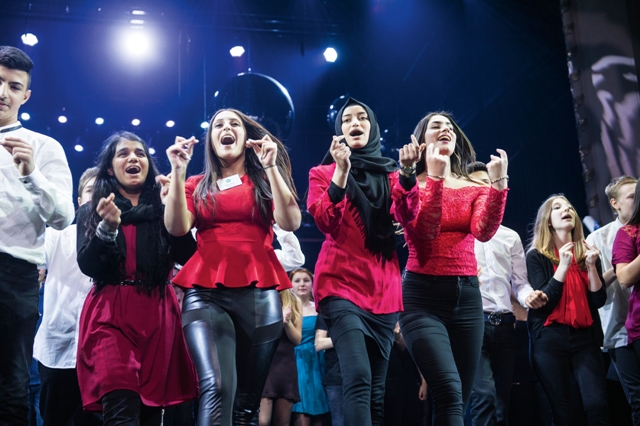
A wonderful moment in the “Oper sucht Klasse!” show at the Komische Oper 2015, when Turkish school kids sang Abraham’s “Wenn wir Türken küssen.” (Photo: Jan Windszus)
Every style of music is appropriate, as long as it touches and fascinates you. Paul Potts and Susan Boyle for example sang opera and musical comedy repertoire, and they moved millions of people. Their stories have been filmed and Potts has sold about 3,5 million CDs.
You yourself studied “musical” at the UdK in Berlin. How did you get exposed to operetta there? How was “operetta” talked about by your fellow students?
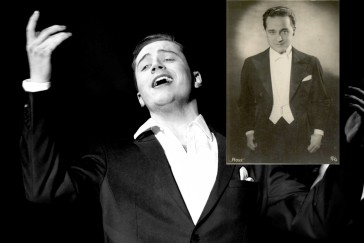
Poster for Christian Miebach’s Max Hansen evening, 2014.
At our “Studiengang” there is – and always was – a strong emphasis on operetta! The legitimate opinion of our professors is that we “musical people” should be able to perform “operetta,” because we have a lot of power, and sex appeal on stage, which you definitely need in this repertoire. These are qualities I have often missed when I saw boring opera singers performing operetta. Besides, musical comedy actors – singing actors – form these brilliant, sexy and complex lyrics differently than opera singers, and the audience gets to know the lyrics better because of this, they discover new meanings and associations. Which makes the songs richer and more meaningful.
Professor Peter Lund, the head of our department at the UdK, has a big knowledge of the operetta repertoire and has directed many operettas over the years, including at the Mörbisch festival. Every year there is an operetta production at the UdK with the students of the 5th semester, where they can make their own experience performing the genre.
In addition, operetta is an integral part in Dr. Wolfgang Jansen’s classes on in theatre history. In these classes I learned what an important influence operetta had on European musical theatre.
Since the late 1980s, Adam Benzwi has taught at the UdK too. Usually, in his classes every student gets an operetta song to practice and perform. I was doubtful when he suggested an operetta song to me the first time, because I thought operetta was just old-fashioned and boring.
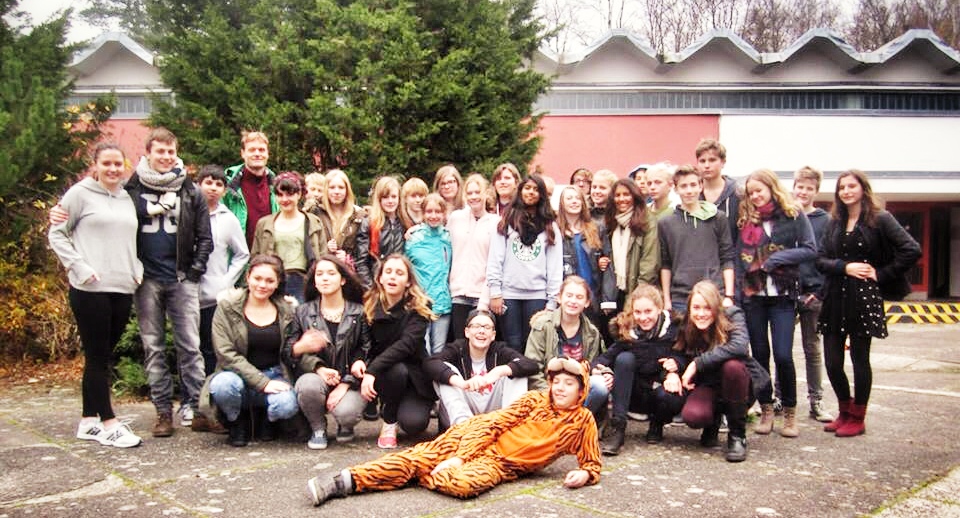
Christian Miebach’s group went to Wehrbellinsee to polish up their act; it’s the former trainings camp of the “Young Pioneers” of East Germany. (Photo: Private)
What can musical comedy singers learn from performing operetta?
In my opinion it’s an opportunity: Don’t think you have to disguise your voice to sound “operetta like.” Just tell the story!
You put together a Max Hansen program. What was the greatest benefit, for you, to sing that repertoire and getting to know the Hansen story better – one of the greatest operetta stars of all time?
Hansen was an absolute all-round performer: he was a comedian, a musician, an actor, he did movies, he was a singer of chansons, operetta, opera. I was totally fascinated by him, because he was the first real “European” musical performer, in my opinion. Since I did the program, I realized: when you are good enough to perform the Hansen repertoire, you can perform anything on stage.
There have been real “battles” over the past 50 years between operetta fans and musical theater fans, between old-fashioned operetta cracks and jazz operetta aficionados. Looking at the situation now, do you think the divides between the groups are overcome, or do they still exist?
They still exist. Every kind of art is a question of taste! For me this is thrilling and interesting, to have these specific points of views from every generation. But I don’t understand the intolerance between the groups. Nowadays you can’t direct an operetta like those TV productions of the 1960s or 70s. On the other hand nobody needs a production which no-one comprehends because the story is not being told properly by some young and “hip” director.
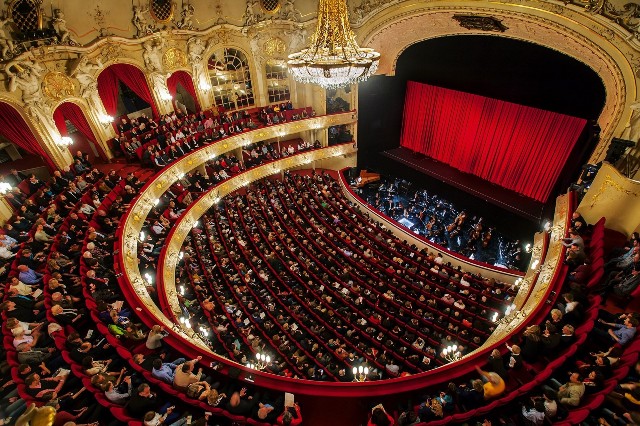
The auditorium of the Komische Oper Berlin. (Photo: Gunnar Geller)
For “Klasse Sucht Oper,” the auditorium was filled with school kids, creating a very ‘alive’ atmosphere at the Komische Oper. How did the children experience the visit to an opera house? What did they like, what did they not like there? What surprised them, what shocked them?
Due to the massive media influence, that wasn’t special for the kids at all. But I noticed that the kids liked to dress up – even the boys. And: young people are a great and responsive audience! On the one hand they like to cheer and clap enthusiastically, but on the other hand they were very skeptical as well. When you are not a convincing actor, the audience notices it immediately. I suppose they were surprised in the final rehearsals when they realized what a hard job it is to “grab” an audience – particularly in such a big auditorium. On TV it looks so much easier to have a successful performance.
Many felt naked on stage, because they didn’t like showing their emotions in public. But finally they coped with it all, and they were great!
Is there another operetta school children project underway for 2015?
This year’s huge success proves that this project should be continued. Working with the music of Paul Abraham was ideal. His music is sexy, it even sounds like rap sometimes. But I suppose the variety of all the genre would be an opportunity for introducing more composers: Kollo or Benatzky or Künneke.
One of the most striking things, for me, was seeing a group of Turkish kids – male and female-with-headscarf – sing “Wenn wir Türken küssen” without any problems with the supposedly “racist” or “stereotypical” text. On the contrary, they seemed to enjoy playing with stereotypes. Are children more open to the Dadaistic side of operetta and all the mad-cap craziness?
First of all, kids are curious and want to be entertained. When they watch smooth and easy performances they quickly feel bored. Furthermore, today’s kids are living in a multi-cultural society and are therefore used to ethnical differences. Musical theatre offers the possibility to connect all kinds of diverse groups, minorities and people in general.
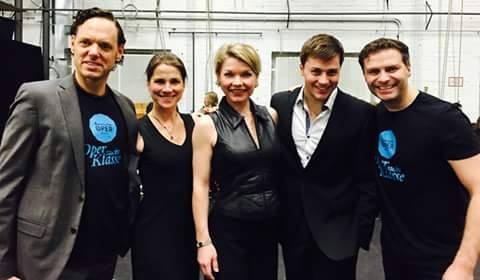
Christian Miebach (2nd from right) together with the other coaches, backstage at the Komische Oper. They too are former students of the UdK. (Photo: Private)
The idea for the project came from Anne-Kathrin Ostrop, head of Musiktheaterpädagogik; it was co-ordinated by Lena Böhm. “Oper sucht Klasse!” was made possible thanks to the generous support of the PwC Stiftung Jugend – Bildung – Kultur.
